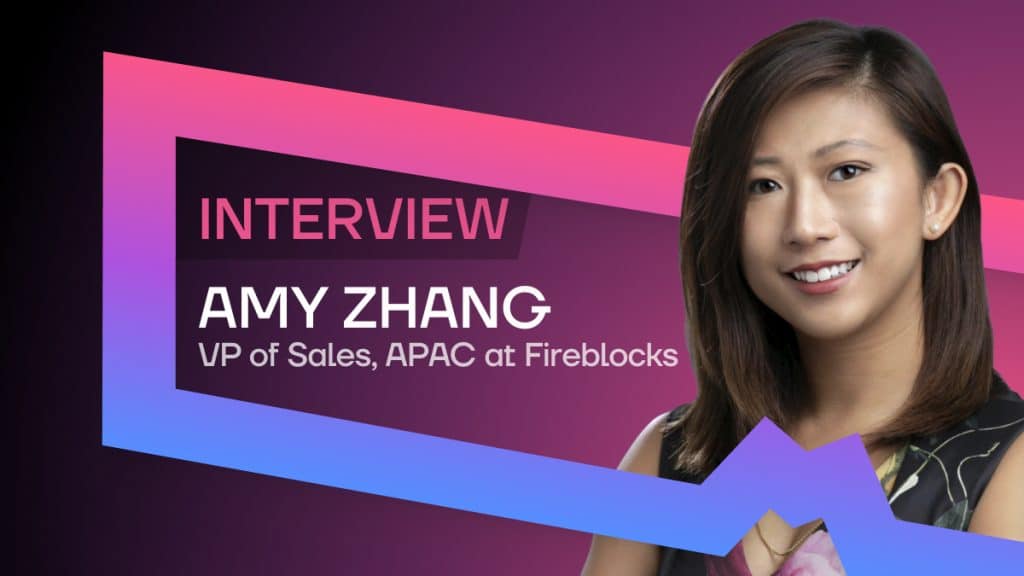Amy Zhang, representing Fireblocks, spoke at the Hong Kong Web3 Festival 2023, focusing on Blockchain, AI, and the Metaverse.

Amy Zhang, an experienced professional with over a decade in the traditional finance sector, made her transition to the web3 world in 2020 by becoming the Vice President of Sales for APAC at Fireblocks, a company specializing in digital asset custody and transfer solutions.
Since its launch in stealth mode in 2019, Fireblocks has accomplished an outstanding feat, facilitating transfers of digital assets worth over $4 trillion. Last year, despite prevailing economic challenges, Fireblocks attracted more than 1,800 institutional clients to its platform, marking a significant increase in performance compared to 2021.
During the Hong Kong Web3 Festival 2023, Danil Myakin, the CEO of Metaverse Post, had a conversation with Zhang following her panel discussion, delving into topics such as the cryptocurrency market, the Metaverse, and AI's role in blockchain.
Please tell us about yourself and elaborate on what Fireblocks does. It’s a major player in the industry with numerous employees, a wide range of products, and substantial funding, but many in the ecosystem may not fully grasp the essential functions that Fireblocks serves.
I’m Amy, managing the sales division for Fireblocks in the APAC area. A common misconception is that Fireblocks functions solely as a custodian. In reality, we are a tech provider catering to over 1,800 clients, all of whom leverage our technology to maintain control of their own digital assets.
Our technology employs a method known as multi-party computation (MPC), which ensures the secure management of your keys. This approach was initially implemented for our first two client groups in Asia when we established our headquarters in Singapore in 2020, including liquidity providers, funds, asset managers, and exchanges, as well as retail platforms.
In addition, we feature the Fireblocks Network, which clarifies another common misconception. We are not a blockchain or a layer-2 solution. Instead, the Fireblocks Network acts as an unchained address book, allowing clients like Galaxy to send funds to GSR without needing to store all their deposit addresses. They simply connect through the Fireblocks Network, allowing us to assist in managing and storing those addresses to process transactions and help sign them on-chain.
We also facilitate connections to a variety of exchanges and financial institutions, enabling clients to easily initiate deposits and withdrawals from these platforms. This encapsulates what most people currently recognize about Fireblocks. Another key area of focus for us is collaboration with banks. For instance, we're partnering with the Bank of New York Mellon to support their custody services. If they wish to provide crypto custody for their clients, they rely on Fireblocks. Recently, banks have also expressed interest in issuing stablecoins, and they leverage our tokenization tool to mint these digital assets in a controlled manner.
Lastly, we work with payment service providers (PSPs) to enable their payment solutions, and we also support various web3 applications, providing a complete range of solutions for dealing with NFTs, non-custodial wallets, and much more, forming the comprehensive Fireblocks product suite. Read more Currently, we have roughly 600 employees worldwide, with the majority based in Tel Aviv, home to our R&D and product development teams, while others are distributed across Singapore, Hong Kong, New York, and London.
Account abstraction poses an intriguing challenge from the reserve perspective. With Fireblocks, users can already access essential information as soon as they create a workspace. When you enter a vault, it displays your crypto holdings, and blockchain references confirm everything stored there.
In terms of account abstraction, we are capable of addressing aspects like separating omniex and managing transactions. The second area involves liabilities, which we are currently discussing with clients to explore wallet management solutions, although we haven't developed a specific product for it yet.
You’ve mentioned that many influential market players partner with you as liquidity providers, and our readers would be keen on your market perspective. With the recent fluctuations in Bitcoin and Ethereum prices, how do you assess the duration of this bull run, and what factors are influencing it?
That's a complex question as I’m not a trader by any means. While I can share my thoughts, I’d appreciate your understanding if I’m not entirely accurate. What stands out regarding this recent bullish trend is its substantial reliance on macroeconomic factors. Specifically, it revolves around the Federal Reserve's decisions on interest rate adjustments and their ongoing strategies. Watching the movements of primary currencies like Bitcoin, it's evident that these trends are closely tied to broader economic scenarios, which will likely remain significant driving forces.
From a technical standpoint, the $30k mark is a considerable psychological threshold. Whether we maintain this level, rise, or fall remains uncertain. However, in the current landscape, there's a noticeable risk-on attitude, and crypto assets are still viewed as high-risk investments. This sentiment likely contributed to the market's upswing, as many found themselves with limited banking access and turned to alternatives like stablecoins. Some argue this dynamic positions Bitcoin as a genuine reserve currency, potentially catalyzing broader acceptance and attracting capital inflows.
However, with the decline of crypto-friendly banking institutions, it has become increasingly challenging for new institutional and retail funds to enter the market. This situation could hint at potential hurdles over the next few months regarding fresh capital flow, particularly as public perception of digital assets remains cautious, given the aftermath of events like FTX and Silvergate.
Additionally, the current market is quite illiquid. Investors may feel less urgency to engage financially, which could present another hindrance. It's also conceivable that further banking collapses might occur, considering the overall macroeconomic context. As a result, many institutional as well as retail investors are understandably adopting a more cautious stance.
We’re featuring you in the Metaverse Post, and I’m interested to hear your personal view on the metaverse. How do you interpret it?
As someone who enjoys gaming, my perception of the metaverse differs from the typical Ready Player One narrative. To me, the metaverse represents a vivid visualization of our data, currently locked within strings of code in platforms like Facebook or Google, which users are unable to access or represent.
At its core, the metaverse embodies a rich representation of our digital identities, which can manifest as social media profiles or virtual avatars reflecting our real life within immersive environments. While there are certainly aspects of decentralization and blockchain underpinnings, it's imperative to recognize that there is a contemporary race among web3 initiatives and groundbreaking technologies like real-time rendering and edge computing emerging from the metaverse. Ultimately, the direction of this evolution will hinge on trending topics and where financial backing is directed.
Despite the rapid advancements in real-time rendering, AI, and other related technologies, I believe that a significant portion of the end users are not yet engaging with data privacy and control issues enough to compel platforms to take action. However, the developments in Europe, such as the GDPR regulations and Apple's decisions regarding advertisement data, indicate a potential shift in that direction that could shape the future.
Thus, for me, the metaverse is a blend of these diverse elements. Its current realization is still largely theoretical and will hinge on numerous technological progressions beyond the realm of blockchain, making it essential to pause and assess its present state.
At the Hong Kong Web3 Festival 2023, Amy Zhang from Fireblocks shares her insights on Blockchain, AI, and the Metaverse, as covered by Metaverse Post.
With over ten years of experience in traditional finance, Amy Zhang transitioned to the web3 space in 2020, stepping into the role of Vice President at Fireblocks.
Amy Zhang from Fireblocks discusses topics such as Blockchain, AI, and the Metaverse during the Hong Kong Web3 Festival 2023.
During the Hong Kong Web3 Festival 2023, Amy Zhang from Fireblocks delves into Blockchain, AI, and the Metaverse.
The Federal Trade Commission’s attempt to block the merger of Microsoft and Activision has ended in a failed appeal.
Date of publication: April 26, 2023, at 9:00 AM; last updated on April 26, 2023, at 9:00 AM.
To enhance your experience in your local language, we sometimes utilize an automatic translation tool. Please be aware that the translation might not be precise, so read carefully.
Amy Zhang, an experienced professional with a rich background in traditional finance, shifted her focus to the web3 arena in 2020, taking the helm of Sales for the APAC sector at Fireblocks, a leader in digital asset custody and transfer technology.
Fireblocks has made impressive strides, processing over $4 trillion in digital asset transfers since its stealthy launch in 2019. In the previous year, their exceptional performance attracted more than 1,800 institutional clients globally, with a remarkable increase in growth compared to 2021, showcasing their resilience during tough market times.
At the Hong Kong Web3 Festival 2023, CEO Danil Myakin of Metaverse Post had a conversation with Zhang post-panel, exploring the dynamics of the cryptocurrency market, the metaverse, and the potential applications of AI in the blockchain sector.
Could you introduce yourself and shed light on the role of Fireblocks? It’s a colossal company with numerous employees, products, and significant funding, yet there’s still a lack of understanding about the pivotal function Fireblocks holds within the industry.
I’m Amy, heading up sales for Fireblocks across the APAC region. A prevalent misconception is that we operate solely as a custodian. In reality, we serve as a technology provider to over 1,800 clients, empowering them to manage their digital assets with full control.
Our approach involves employing a technology known as multi-party computation (MPC), which secures the management of cryptographic keys. This was first implemented for two early clients in Asia shortly after we established our Singapore headquarters in 2020, including liquidity providers, asset managers, exchanges, and retail platforms. This is essentially how many recognize us.
Furthermore, we have developed what we term the Fireblocks Network, clarifying a common misunderstanding. We are neither a blockchain nor a layer-2 solution. Rather, the Fireblocks Network acts as a decentralized address book, allowing our clients, such as Galaxy, to send funds to GSR without needing to manage a multitude of deposit addresses for all assets traded between them. They connect via the Fireblocks Network, which facilitates transaction management and signatures on-chain.
Additionally, we equip them to engage with a variety of exchanges and banks, enabling seamless deposits and withdrawals. This encapsulates what many currently understand about Fireblocks. Another key sector we focus on is partnering with banks; for instance, we collaborate with Bank of New York Mellon (BNY Mellon) on their custody solutions. If they decide to offer cryptocurrency custody services to their clients, they leverage our technology. Recently, banks have also shown interest in issuing stablecoins, utilizing our tokenization tool for controlled asset creation.
One of the final pieces in our offering is our collaboration with payment service providers (PSPs), enabling them to handle both pay-in and pay-out transactions. Moreover, we also support a range of web3 applications, providing a comprehensive suite of tools for dealing with NFTs, noncustodial wallets, and beyond, all contributing to the Fireblocks ecosystem.
Currently, we boast around 600 employees worldwide, primarily located in Tel Aviv, where our R&D and product development teams are based, with additional offices in Singapore, Hong Kong, New York, and London.
You pointed out that Fireblocks functions mainly as a tech entity. Lately, I’ve heard substantial discussions surrounding account abstraction, which is seen as a vital element for the mainstream acceptance of crypto. What insights can you share about this?
The concept of account abstraction presents fascinating challenges if viewed through the lens of reserves. With Fireblocks, users can see this information as soon as they set up a workspace. By accessing a vault, you'll find crypto assets within it, and you can trace everything on the blockchain.
Currently, we can already manage aspects of account abstraction such as separating wallets, adding transactions, and navigating complex details. On another note, we are exploring how wallets can address liability management, though we haven’t developed a product for this yet.
Press Releases
Markets
Software Technology As we’re conducting this interview for the Metaverse Post, I’m curious about your perspective on the metaverse. How do you personally define it?
by
Being an avid gamer, my understanding of the metaverse diverges from the typical Ready Player One analogy. For me, the metaverse symbolizes a visually rich interpretation of the data that currently exists as mere strings of code in corporate databases like those of Facebook or Google, which users cannot access or represent.
Victoria d'Este











